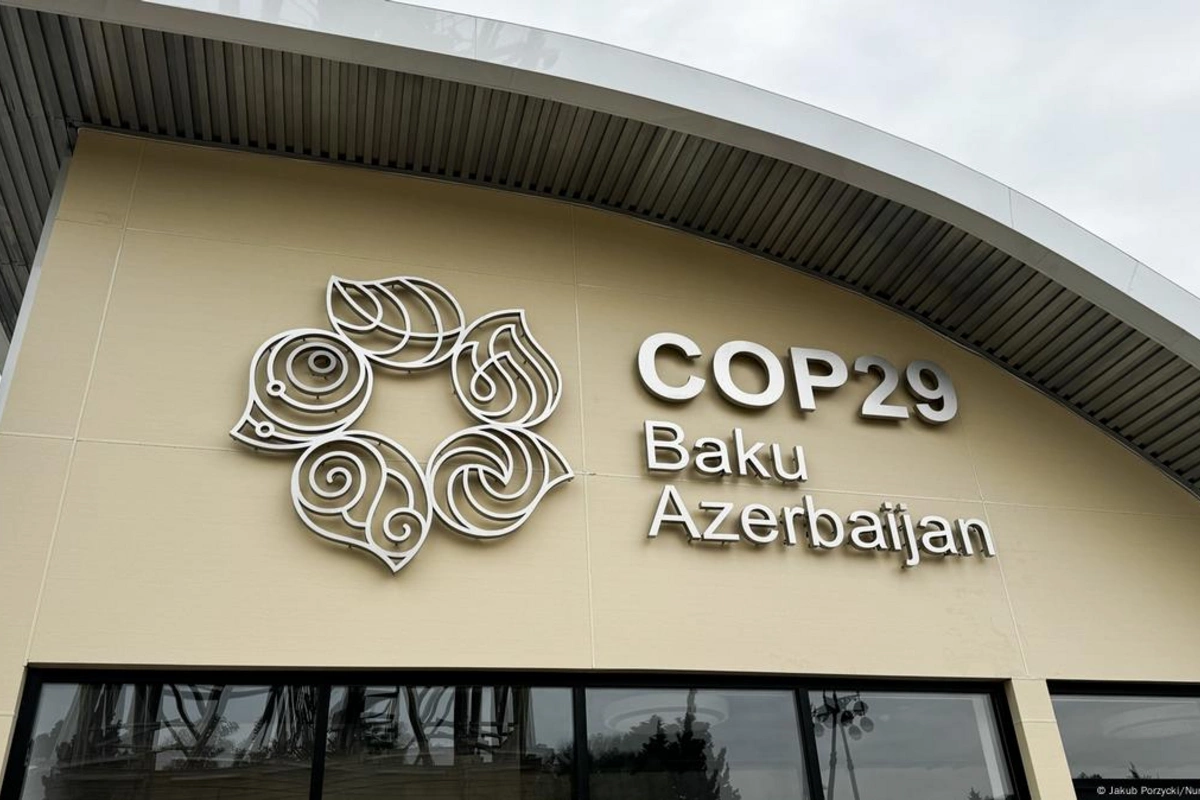
The session, organized jointly by Azerbaijan’s Ministry of Ecology and Natural Resources and the Secretariat of the Framework Convention "Caspian Sea Water Decline in Light of Climate Change," brought together officials from Caspian littoral states—Azerbaijan, Iran, Kazakhstan, Russia, and Turkmenistan—as well as the Executive Director of the United Nations Environment Programme (UNEP) and representatives from other international organizations.
Image: Jakub Porzycki/NurPhoto/picture alliance
A significant meeting on "Caspian Sea Water Decline in Light of Climate Change" was held at Azerbaijan's national pavilion during the ongoing COP29 in Baku, The Caspian Post reports.
The session, organized jointly by Azerbaijan’s Ministry of Ecology and Natural Resources and the Secretariat of the Framework Convention "Caspian Sea Water Decline in Light of Climate Change," brought together officials from Caspian littoral states—Azerbaijan, Iran, Kazakhstan, Russia, and Turkmenistan—as well as the Executive Director of the United Nations Environment Programme (UNEP) and representatives from other international organizations.
In her address, Azerbaijan's Deputy Minister of Ecology and Natural Resources, Umayra Taghiyeva, highlighted the significant decline in Caspian Sea water levels in recent years due to climate change, emphasizing the need for regional cooperation to preserve this unique ecosystem.
She underlined the importance of joint efforts by experts from the Caspian states to comprehensively study changes in water levels and develop adaptive measures.
During the event, UNEP Executive Director Inger Andersen presented a report titled "Caspian Sea Water Level Fluctuations and Climate Change," which was prepared in collaboration with Azerbaijan’s Ministry of Ecology and Natural Resources.
Representatives from the World Bank and the Green Climate Fund also participated in the discussions, presenting on related topics.
The session concluded with the adoption of the "Declaration of Ministers and Senior Officials of Caspian States on Enhancing Cooperation Regarding the Decline of Caspian Sea Water Levels".
To note, the 29th session of the Conference of the Parties to the UN Framework Convention on Climate Change (COP29), which will run until November 22, opened at the Baku Olympic Stadium on November 11. It is the largest event organized by Azerbaijan to date, and the first time in the region that it is being held in Azerbaijan.
Within COP29, the highest level event - the summit of world leaders on climate action – was held on November 12–13.
The main expectation from COP29 is to agree on a fair and ambitious New Collective Quantitative Goal (NCQG) on climate finance. The COP29 chairmanship has launched 14 initiatives that include linkages between climate action and the Sustainable Development Goals, including green energy corridors, green energy storage, harmony for climate resilience, clean hydrogen, methane reduction in organic waste, action on green digital technologies, and other topics.
In addition to being a top priority that creates the conditions for action, creating climate finance will also help fulfill the 1.5°C pledge by bringing everyone together.
The UN Framework Convention on Climate Change is an agreement signed at the Rio Earth Summit in June 1992 to prevent dangerous human interference in the climate system. The acronym COP (Conference of Parties) stands for “Conference of Parties” and is the highest legislative body overseeing the implementation of the Framework Convention on Climate Change.
A total of 198 countries are parties to the Convention. Unless otherwise decided by the parties, COP is held annually. The first COP event was held in March 1995 in Berlin, and its secretariat is located in Bonn.
Share on social media
The session, organized jointly by Azerbaijan’s Ministry of Ecology and Natural Resources and the Secretariat of the Framework Convention "Caspian Sea Water Decline in Light of Climate Change," brought together officials from Caspian littoral states—Azerbaijan, Iran, Kazakhstan, Russia, and Turkmenistan—as well as the Executive Director of the United Nations Environment Programme (UNEP) and representatives from other international organizations.